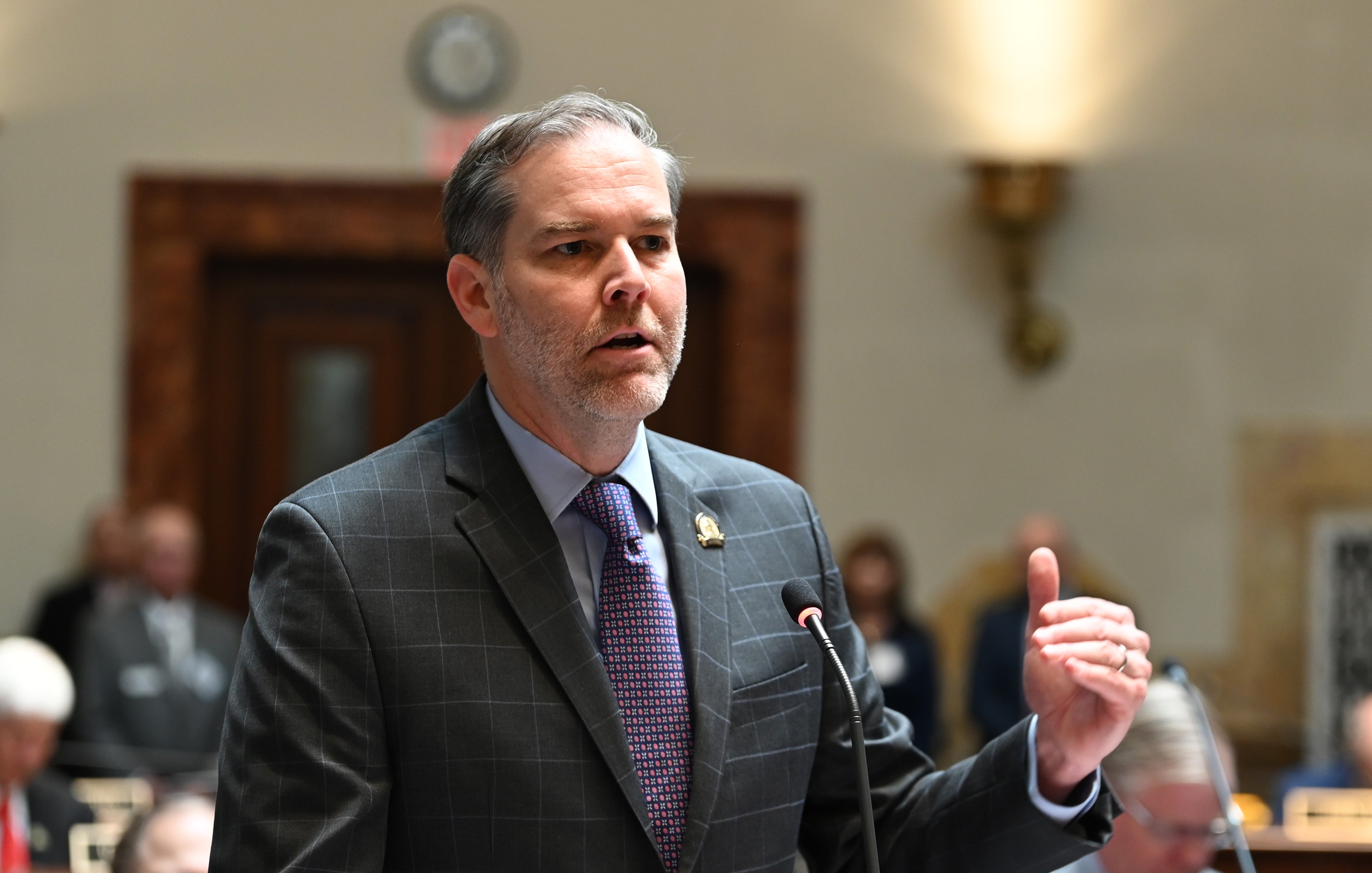Senate Bill 150 update: A temporary block, language loophole and AG opinion
Published 8:55 am Monday, July 10, 2023

- FRANKFORT, March 29 – Sen. Max Wise, R-Campbellsville, speaks on Senate Bill 150, legislation related to gender services and education.
Last week, hours before it was set to go into effect, part of a new Kentucky law banning puberty blockers and hormone therapy for transgender minors was temporarily blocked by a federal judge.
Senate Bill 150, one of the most prominent bills of the 2023 General Assembly, includes provisions banning health care providers from prescribing puberty blockers or hormones to transgender youth.
It also requires health care providers to either immediately stop or slowly wean transgender youth off these treatments, if they had been previously prescribed.
Health care providers who violate this law would have their license and certification revoked, and would be able to be sued by affected patients until they reach 30 years of age.
It does not limit the use of hormone or puberty blocking treatments for minors experiencing several other conditions and disorders who are not transgender.
Wednesday, June 28, a federal judge for the U.S. District Court for the Western District of Kentucky granted the American Civil Liberties Union of Kentucky and the National Center for Lesbian Rights a temporary injunction that halted enforcement of the law while a larger lawsuit plays out.
The law was supposed to go into effect on June 29. Judge David Hale decided that the plaintiffs– the ACLU, NCLR and seven transgender minors and their parents – had a strong enough legal argument to make their likelihood of winning the larger court case fairly high.
So, to avoid medical confusion and unnecessary complications by banning treatments that are, according to Hale’s legal opinion, likely to be resumed upon the conclusion of the larger court case, he decided to go ahead and pause enforcement of the law until a decision is made.
In his opinion, Hale said that the plaintiff’s “strong likelihood of success” on the merits of the case was the main reason for his decision.
The plaintiffs have argued that a ban on puberty blockers and hormone treatment for transgender minors, but not other minors in other circumstances, is a sex-based discrimination that violate the Equal Protection Clause of the Fourteenth Amendment.
In addition to “singling out” transgender minors, they also argue that the law violates parents’ rights to make decisions concerning the care, custody and control of their children according to the Due Process Clause.
Hale wrote that every major medical organization in the nation agrees that puberty blockers and hormone treatments are “safe, effective and appropriate when used in accordance with clinical guidelines.”
Daniel Cameron, Kentucky attorney general and Republican governor nominee, has appealed the ruling. He called the decision “misguided” and said that it disregarded the Kentucky legislature’s right to make public policy for the state.
“Senate Bill 150 is a commonsense law that protects Kentucky children from unnecessary medical experimentation with powerful drugs and hormone treatments,” Cameron said. “These procedures are not based on science, threaten the safety of minors, and have irreversible life-long consequences on children’s health.”
The larger lawsuit, Doe v. Thornbury, is ongoing in the U.S. District Court for the Western District of Kentucky.
ACLU of Kentucky Legal Director Corey Shapiro said in a statement that they are grateful for the court’s action on Senate Bill 150’s “egregious ban on medically necessary care.”
“This is a win, but it is only the first step. We’re prepared to fight for families’ right to make their own private medical decisions in court, and to continue doing everything in our power to ensure access to medical care is permanently secured in Kentucky.”
In other news, Cameron’s attorney general office has issued an opinion on another section of Senate Bill 150.
The use of the word “or” instead of “and” in a section of SB150 has left room for the Kentucky Department of Education to find a loophole in the law.
The law says that school districts are required to prohibit instruction on human sexuality and sexually-transmitted diseases for students in grade five and below or ban instruction with the goal of exploring gender identity, expression or sexual orientation for all ages.
While the legislature meant for both provisions to be followed, KDE issued guidance for school districts based on the literal language, which offers districts a choice between following one or the other.
The attorney general opinion stated that the law is meant to prohibit both types of instruction.
“The KDE’s interpretation would render part of the statute meaningless, creating an absurd result that is clearly contrary to what the legislature intended,” it said.
The opinion also touched on two other SB150 provisions – one that prevents school districts from requiring school employees to use a student’s preferred pronouns and another banning transgender students from using bathrooms that do not align with their biological sex.
The office’s opinion stated that, contrary to KDE’s statements, neither of these provisions would violate Title IX, because currently, the federal circuit courts are split on whether Title IX’s ban on “sex-based discrimination” applies to transgender individuals.





